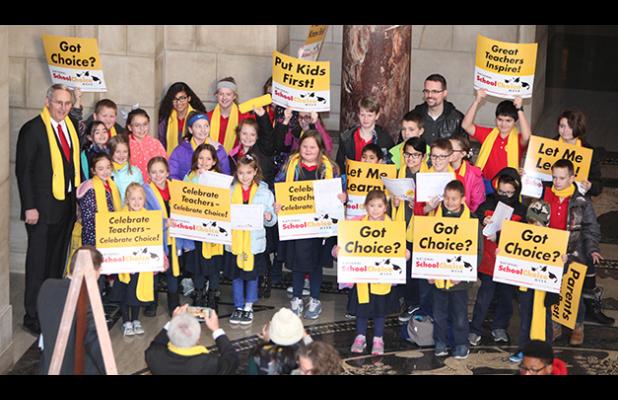
A group of private school students gathers at the capitol building in Lincoln Jan. 24 to demonstrate their support for school choice at a rally for National School Choice Week. At the event, Sen. Lou Ann Linehan announced the introduction of the Opportunity Scholarships Act, LB670, which would provide state income tax credits for donations to nonprofit, scholarship-granting organizations. CORY RICHMOND
Shepherd's Voice
The Nebraska Catholic Conference: Lobbying For The Common Good
February 15, 2019
As you know, each bishop has pastoral responsibilities for Catholic life and apostolates within his own diocese. But because Jesus has sent us into the world to bring the light of the Gospel and to let it shine everywhere, the three bishops of Nebraska feel a responsibility to not only participate in the internal affairs of the church, but also to share the truth with our neighbors across this state. One of the ways in which we do that very effectively is through the work of the Nebraska Catholic Conference (NCC).
A new legislative session began in Lincoln last month. It won’t surprise anybody to know that there are many people who earn their living by lobbying the Legislature. As is evident in the news, various interest groups are working to push one agenda or another, or advocate for a particular cause.
I am not ashamed to say that through the work of the NCC, we are trying to exert an influence on the debates over key pieces of legislation, and on the crafting of public policy that will serve the common good. We have a professional staff working for the three bishops at the office of the Conference in Lincoln. I am very proud of them, and grateful for their service. They are relatively young adults, but well-educated, and committed to the life of the church. They represent Nebraska’s Catholic community very well and they take it upon themselves to stay abreast of the many, many bills before the Legislature.
While we know it is unlikely that we will influence every aspect of life that the Legislature might address, there are important issues being debated which align with the priorities that the Catholic Conference has adopted. In these public policy debates, we strive to not only help ourselves, but to help our neighbors, and deepen respect for human dignity here in Nebraska.
The NCC’s advocacy efforts cover four areas of concern: human life and dignity, education, marriage and family life, and social and human development. As Catholics, we not only have the right to bring the light of the Gospel into the public square, but an obligation to do so.
Among the hundreds of bills up for consideration during this session, there are two I would particularly like to bring to your attention, which highlight the opportunity and the need for our public witness. They are described below.
While the staff of the NCC does excellent work on our behalf, all Catholics of good will should be informed and engaged in the political process, and lend our voices in support of building a more just society.
I encourage you to pray for the fruitfulness of our advocacy efforts at the Capitol, and to join the NCC’s network of advocates – simply visit necatholic.org and click “Join Our Network.”
LB209 – Abortion Pill Reversal Act
Key facts:
• Abortion via pill – sometimes called chemical or “medical” abortion – is a procedure by which a mother takes a course of two different pills to abort her baby.
• Fifty-five percent of abortions in Nebraska are chemical abortions.
• There is a 68 percent chance the child will survive if the mother undergoes the necessary progesterone treatment in a timely manner after ingesting the first abortion pill.
What the law would do:
• LB209 would add a new section to Nebraska’s informed consent law, requiring an abortionist to inform a woman that it may be possible to reverse a chemical abortion if she changes her mind, and would give her information so that she can connect with a local medical professional who is trained in abortion pill reversal.
Find out more at necatholic.org.
LB670 – Opportunity Scholarships Act
Key facts:
• Tax credit scholarships have helped over 290,000 students nationwide.
• Donations for similar programs across the country exceed $1.1 billion to date.
• In Iowa, the tax credit scholarship program has saved the state at least $280 million since its enactment in 2006.
• In 18 states overall, tax credit scholarships have saved $1.7 to $3.4 billion to date.
How it would work in Nebraska:
• The proposed program provides a 100 percent state income tax credit for donations to nonprofit, scholarship-granting organizations.
• The state will provide $10 million in total income tax credits, with the amount of tax credits available increasing every year if 95 percent of the income tax credit cap is reached.
• This program will change the lives of thousands of Nebraska’s kids every year. In 2016 alone, Children’s Scholarship Fund of Omaha turned away more than 600 applicants due to lack of funds.
Find out more at investinkidsnebraska.org.